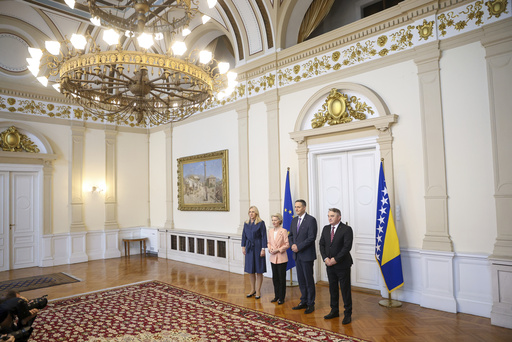
SARAJEVO, Bosnia-Herzegovina — On Friday, Ursula von der Leyen, the President of the European Commission, reaffirmed the EU’s commitment to supporting Bosnia and Herzegovina as it navigates crucial reforms necessary for progressing toward European Union membership.
During her visit to Bosnia, part of a broader tour of the Western Balkan nations aspiring for EU membership, von der Leyen aimed to convey that the expansion of the EU remains a key objective for the 27-member bloc. Following her time in Bosnia, she continued her journey to Serbia.
The countries of the Western Balkans—including Albania, Bosnia, Kosovo, Montenegro, North Macedonia, and Serbia—are currently at various stages of their EU application processes. These nations have expressed frustration over the slow advancement in their membership journeys. However, Russia’s invasion of Ukraine in February 2022 has motivated European leaders to accelerate their support for these nations in joining the European Union.
Bosnia attained candidate status in 2022, and EU leaders agreed in March to initiate membership negotiations, although substantial work remains before Bosnia can make significant progress.
“We share the same vision for the future, where Bosnia-Herzegovina becomes a fully integrated member of the European Union,” von der Leyen stated during a joint press conference with Prime Minister Bojana Kristo. “Let us continue our efforts. We have already achieved much, yet there is still distance ahead. I have confidence in your ability to succeed.”
Last year, EU officials unveiled a growth plan worth 6 billion euros (approximately $6.5 billion) aimed at the Western Balkans, with hopes of doubling the region’s economy within the next decade and expediting their path to EU membership. This financial assistance is dependent on implementing reforms that align the countries’ economies with EU standards.
On Wednesday, the Commission granted approval for the reform agendas of Albania, Kosovo, Montenegro, North Macedonia, and Serbia, following endorsements from EU member states. This step is critical for starting payments under the growth plan, contingent upon the completion of agreed-upon reforms.
“The accession process is merit-based; we do not adhere to rigid criteria, but rather assess the progress made by each nation,” von der Leyen explained. “What matters is having an ambitious reform agenda, just like the other five nations in the Western Balkans. We are prepared to assist you in moving forward.”
Years after the devastating ethnic conflict from 1992 to 1995 that resulted in more than 100,000 deaths and displacing millions, Bosnia remains politically fragmented and ethnically divided. The Serb-majority region, one of the two autonomous entities within Bosnia, has been striving to gain heightened independence.
Upon her arrival in Bosnia, von der Leyen visited Donja Jablanica, a village in central Bosnia that suffered extensive damage from recent floods and landslides. The calamity in early October led to the unfortunate loss of 27 lives and left the village largely covered in debris from a nearby quarry.
Von der Leyen announced that the European Union would provide an immediate aid package of 20 million euros ($21 million) and pledged to support reconstruction efforts in the future.
